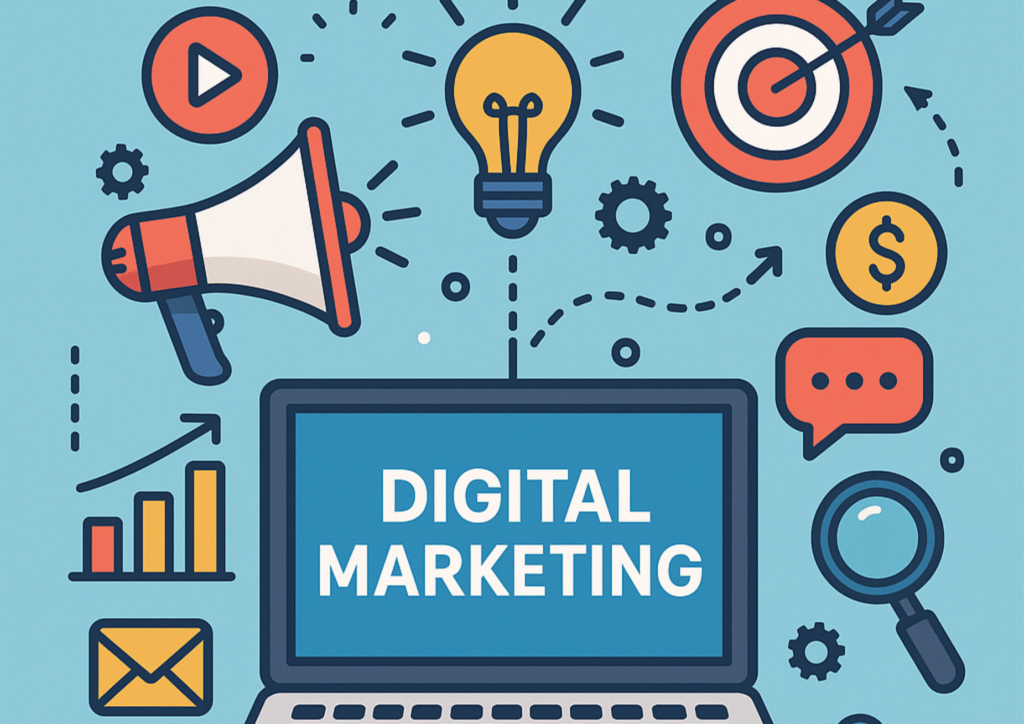Digital Marketing Demystified: A Complete Guide to Strategies, Tools, and Trends in the Online Era
In today’s hyperconnected world, digital marketing is not just an option—it’s a necessity. Whether you’re a small business owner, a startup founder, or a seasoned marketer, understanding the ins and outs of digital marketing is essential to survive and thrive in the modern marketplace. This guide breaks down digital marketing into simple, actionable components, helping you make sense of its strategies, tools, and evolving trends.
What is Digital Marketing?
Digital marketing refers to all marketing efforts that use the internet or an electronic device. It encompasses a wide range of channels, including websites, social media, search engines, email, mobile apps, and more, allowing businesses to connect with current and potential customers in real-time.
Unlike traditional marketing, which relies on print ads or broadcast media, digital marketing offers measurable, scalable, and targeted outreach.
Core Strategies in Digital Marketing
1. Search Engine Optimization (SEO)
SEO involves optimizing your website and content to rank higher in search engine results pages (SERPs). Key components include keyword research, on-page SEO (like meta tags and internal linking), and off-page SEO (like backlinks).
Goal: Increase organic (non-paid) traffic to your website.
2. Content Marketing
This is the creation and distribution of valuable, relevant content to attract and engage a target audience. Formats include blog posts, videos, infographics, eBooks, podcasts, and webinars.
Goal: Build trust and establish authority, ultimately leading to conversions.
3. Social Media Marketing
Using platforms like Facebook, Instagram, LinkedIn, X (formerly Twitter), TikTok, and YouTube, social media marketing is about brand awareness, community engagement, and customer interaction.
Goal: Grow brand presence and interact with your audience where they spend their time.
4. Pay-Per-Click Advertising (PPC)
PPC campaigns (like Google Ads or Facebook Ads) allow businesses to display ads to targeted audiences and pay only when the ad is clicked.
Goal: Generate quick traffic and leads with measurable ROI.
5. Email Marketing
Email marketing is one of the most cost-effective forms of digital marketing. It involves sending targeted messages to a list of subscribers, often through newsletters, promotional campaigns, or automated sequences.
Goal: Nurture leads, encourage repeat purchases, and build customer loyalty.
6. Affiliate & Influencer Marketing
Partnering with individuals or other businesses to promote your products/services can widen your reach and build credibility.
Goal: Leverage others’ audiences to drive traffic and sales.
7. Marketing Automation & CRM
Platforms like HubSpot, Mailchimp, or Salesforce automate repetitive tasks (like sending follow-up emails or segmenting audiences) and help manage customer relationships.
Goal: Streamline marketing efforts and personalize communication.
Top Tools for Digital Marketers
- Google Analytics – Website traffic and user behavior insights
- SEMrush / Ahrefs – SEO and keyword research
- Canva – Easy graphic design for social media and content
- Hootsuite / Buffer – Social media scheduling and management
- Mailchimp / ConvertKit – Email marketing platforms
- Meta Ads Manager / Google Ads – Advertising platforms
- Hotjar – Heatmaps and user experience feedback
- Zapier – Marketing automation between apps
Emerging Trends in Digital Marketing (2025 and Beyond)
- AI and Machine Learning: Personalized content, predictive analytics, and chatbots are becoming essential.
- Voice Search Optimization: More users search via voice (Alexa, Siri), changing SEO tactics.
- Short-Form Video Dominance: Platforms like TikTok, Instagram Reels, and YouTube Shorts are vital.
- First-Party Data Focus: With privacy changes (like the end of third-party cookies), collecting your own customer data is critical.
- Augmented Reality (AR) in Advertising: Virtual try-ons and immersive brand experiences are becoming mainstream.
Why Digital Marketing Matters More Than Ever
With over 5 billion internet users globally, digital marketing offers unprecedented access to your audience. Unlike traditional methods, it allows for:
- Real-time data and feedback
- Scalability and flexibility
- Laser-focused targeting
- Cost efficiency
- Clear performance metrics (KPIs)
Conclusion
Digital marketing is a dynamic and powerful tool in any modern business strategy. It levels the playing field, enabling even the smallest brands to compete with industry giants. By mastering the core strategies, using the right tools, and staying ahead of the trends, you can harness the full potential of digital marketing to grow your business in the online era.

